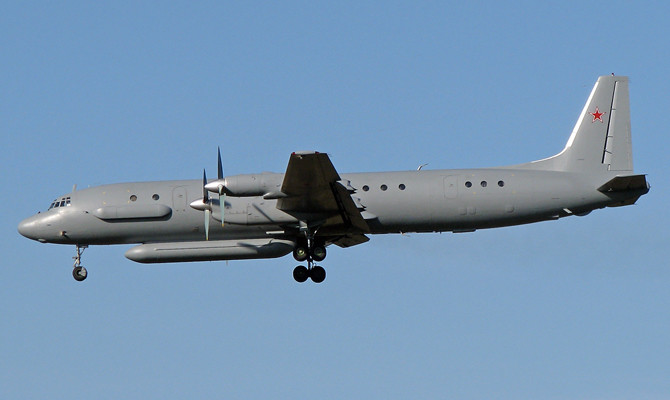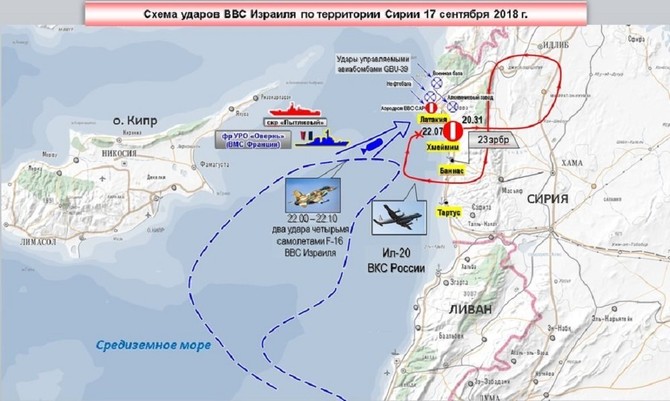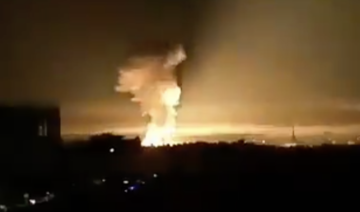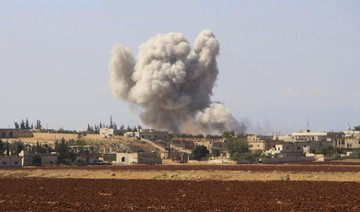BEIRUT: Israeli Prime Minister Benjamin Netanyahu and Russian President Vladimir Putin sought to defuse a crisis on Tuesday after Syrian defenses mistakenly downed a Russian warplane after Israeli air strikes.
The incident late Monday was the deadliest known case of friendly fire between Syria and its key backer Russia since Moscow’s game-changing 2015 military intervention.
Putin said it was the result of “tragic accidental circumstances.”
The Ilyushin plane dropped off the radar over the Mediterranean after Turkey and Russia announced a deal that offered millions of people reprieve from a threatened military assault in northern Syria’s Idlib province.
The deadly chain of events started when Israeli missiles struck the coastal region of Latakia.
Israel said it had targeted a Syrian military facility where weapons manufacturing systems were “about to be transferred on behalf of Iran” to Lebanese Shiite group Hezbollah.
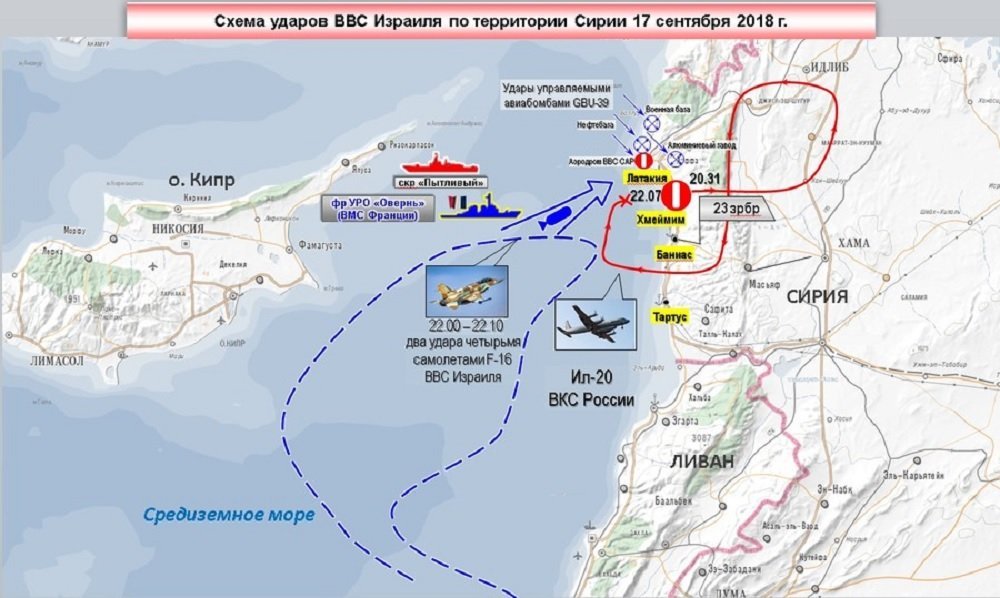
A map released by the Russian military shows the flight paths of the Israeli jet and the Russian aircraft. (Russian Defense Ministry)
It sees Iran’s military presence in Syria as a threat, and Netanyahu told Putin by phone on Tuesday his forces would keep acting against it.
“Israel is determined to stop Iranian military entrenchment in Syria, and the attempts by Iran, which calls for the destruction of Israel, to transfer to Hezbollah lethal weaponry (to be used) against Israel,” said Netanyahu.
Israel expressed “sorrow” for the Russian deaths, but insisted the Russian plane had been felled by “extensive and inaccurate Syrian anti-aircraft (surface-to-air missile) fire.”
Putin said Russia would beef up security for its forces in Syria, in what he called “steps that everyone will notice.”
The Kremlin said Putin also warned Netanyahu against carrying out such operations in the future.
Putin “reminded” Netanyahu that such operations “violated Syrian sovereignty” and said “agreements around the prevention of dangerous incidents were not observed.”
“The president of Russia urged the Israeli side not to allow such situations from now on,” it added.
The plane, downed by Syria’s Russian-made S-200 air defense system, had a crew of 15 who were all killed, Moscow said.
The Russian military accused Israeli pilots of using “the Russian plane as a cover, exposing it to fire from Syrian air defenses.”
Israel denied the accusations, saying its jets were already back in Israeli airspace when Syrian forces launched the missiles that hit the Russian plane.
Russia stressed the incident would have no impact on the Idlib deal, but warned Israel of reprisals and summoned its envoy in Moscow.US Secretary of State Mike Pompeo also expressed “sorrow” over the Russian deaths, and said the incident showed “the danger of tragic miscalculation in Syria’s crowded theater of operations.”
The Syrian Observatory for Human Rights said some missiles, suspected to be Israeli, did get through the Syrian defenses and struck ammunition depots at the site of the technical industries institute.
Rami Abdel Rahman, the head of the Britain-based monitoring group, said at least two fighters were killed and 10 wounded in the strike.
Israel has conducted frequent raids in recent months against Syria’s military infrastructure, including against bases it believes host Iranian combatants.
Earlier in September, Israel admitted carrying out 200 strikes in Syria over the past 18 months.
The Syrian blunder came hot on the heels of a major deal announced by Putin and his Turkish counterpart Recep Tayyip Erdogan after talks in the Russian resort of Sochi.
The two key actors agreed to create a demilitarised zone, 15-20 kilometers (9-12 miles) wide, along the line of contact between rebels and regime troops in the Idlib region.
That would be implemented by October 15 and would entail a withdrawal of all jihadist fighters from the area.
The demilitarised zone will be secured with the help of “mobile patrol groups of Turkish contingents and contingents of Russian military police,” Putin said.
By the end of the year, transport routes must be restored between Latakia and Aleppo, as well as those linking the port to Hama city, he added.
Iran, the third member of the so-called Astana process aimed at ending Syria’s seven-year war, praised the deal as an example of “responsible diplomacy.”
United Nations Secretary General Antonio Guterres said the accord should avert an all-out military assault on the rebel stronghold and “provide reprieve for millions of civilians.”
Damascus, which has regained swathes of territory thanks to deadly Russian-backed offensives in recent months, welcomed the Sochi agreement.
But the deal was met with distrust by some of the three million Syrians living in the Idlib region.
“The decision that came out was just a partial one. It doesn’t solve the Syrian people’s problem,” said Wassim Sweid, one of hundreds of protesters who gathered in the rebel-held town of Binnish.
“In my opinion, this agreement will not put a stop to the shelling.”
The UN had warned a fully-fledged ground assault could spark the worst humanitarian catastrophe yet in a conflict that has killed more than 360,000 people.


